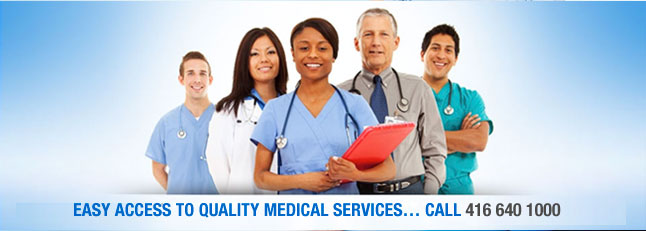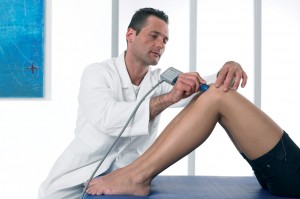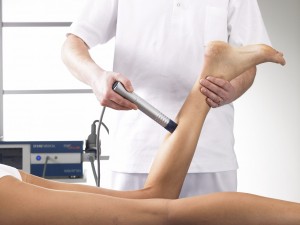 Revive Health Centres offers one of the latest techniques in treating a variety of difficult to treat problems. Below is some information about the procedure and if you have any questions please contact us 24 hours a day for an answer.
Revive Health Centres offers one of the latest techniques in treating a variety of difficult to treat problems. Below is some information about the procedure and if you have any questions please contact us 24 hours a day for an answer.

Q & A for Shockwave Therapy
What is extracorporeal radial shockwave therapy?
Extracorporeal Radial Shockwave Therapy is a series of high-energy percussions to the affected area. The shockwave is a physical sound wave "shock", not an electric one.
How does it work?
1) Treatment produces an inflammatory response. The body responds by increasing metabolic activity around the site of pain. This stimulates and accelerates the healing process.
2) Shockwave breaks down scar tissue and possibly calcification as well
3) Transmission of pain is blocked.
Indications: Shockwave Therapy is used Worldwide to treat:
|
|
What are the benefits of Shockwave Treatment?
This therapy works without the use of X-rays or drugs; it stimulates the body's natural self-healing process. There is actually an immediate reduction of pain and improved ease of movement. Shockwave therapy may also eliminate your need for surgery.
How long does the treatment last?
2000 shocks are administered per session, which last approximately 5 minutes.
How many treatments will I need?
Normally three treatments are necessary at weekly intervals; there is a small possibility that 2 additional treatments may be necessary if your condition is very chronic.
Does the treatment hurt?
The very short 5-minute treatment may be slightly uncomfortable for some patients however most people find the experience very easy to tolerate, especially after having experienced the extensive and prolonged discomfort caused by their heel pain. However, if you find that you cannot tolerate it, adjustments can be made at the time of treatment to the intensity setting on the Shockwave that will decrease the amount of pressure that you will feel.
Will it hurt after the treatment?
There may be no immediate pain, but some discomfort may be experienced 2-4 hours after the treatment. In some cases it can last up to 48 hours and in very rare cases, the pain can last up to 5 days
What should I do if I am in pain after the treatment?
The Shockwave will trigger what is called “an inflammatory response” that will assist and enhance the body’s natural healing mechanism. For this reason, we do not use anti-inflammatory medications, ice or any other type of treatment aimed at reducing inflammation. Any pain that you feel should subside within 24 hours. Use Tylenol (Acetominaphine) if necessary, provided you have no trouble with this medication. Do not use Ibuprofin or ASA, as these are both anti-inflammatory medications.
What if it feels good after the treatment?
Even if it feels good, we recommend decreased activity for 48 hours following the treatment.

Is Shockwave Therapy covered by my insurance?
If you have insurance you will want to ask your provider about the requirements of your coverage. You will be invoiced under Extracorporeal Radial Shockwave Therapy for treatment.
What is the success rate of this kind of treatment?
A successful treatment is considered as a patient having at least 75% reduction in pain within 3 months. Worldwide, success rates for Shockwave treatment are between 80 - 90%.
What ifit doesn't work for me?
Although the short-term effects alone are usually exceptional and easily evaluated, the long-term benefits of this treatment may take up to 3-4 months to fully realize. If after this time there has not been any marked improvement, you should see your doctor for further treatment options.
Are there contraindications and/or precautions?
- Coagulation disorders, thrombosis, heart or circulatory patients
- Use of anticoagulants, especially Marcumar, Heparin, Coumadin
- Tumour diseases, carcinoma, cancer patients
- Pregnancy
- Polyneuropathy in case of diabetes mellitus
- Acute inflammations / pus focus in the target area
- Children in growth
- Cortisone therapy up to 6 weeks before first treatment
- Blood or nerves supply too close to the affected area
Side effects
- Swelling, reddening, haematomas (bruising)
- Petechiae (pin prick like red spots from small blood vessel bruising))
- Pain
- Skin lesions at the site of previous cortisone therapy
These side effects generally abate after 5 to 10 days.
Why am I asked to sign a consent form?
We want each patient to be informed of all aspects of treatment. Pain can increase temporarily. Bruising and or swelling are also possible.
CALL 416 640 1000 ext 1 to find a Clinic near you or email us at: reception@revivehealthcentres.com
Toronto Locations:
- 1840 Eglinton Ave. West 2nd Flr. (Dufferin & Eglinton)
- 200 Elizabeth Street (Toronto General Hospital)
- 771 St. Clair Avenue West (St. Clair & Arlington)
Mississauga Location: 2500 Hurontario St. (Near Freshco)












